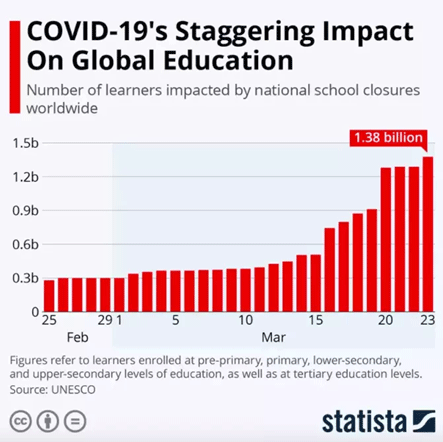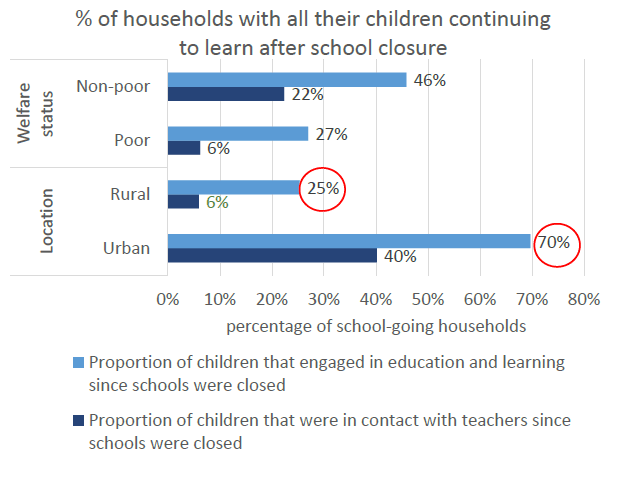
BY JOSEPH NDONDO
Globally over 1.38 learners were affected by the Covid-19 pandemic since it was first reported two years ago in Wuhan, China, in December 2019. The pandemic subsequently spread globally to become the fifth documented pandemic since the 1918 flu pandemic. Many schools were forced to shut their doors in compliance with Government lockdown directives that were a major characteristic of the year 2020.
Global impact of Covid-19 on education
To date, many countries are still resorting to lockdowns and shutdowns of various forms in order to curb resurging variants of the virus and rising infection cases. When schools were shut, some had to shift to online learning which is sometimes referred to as virtual learning, remote learning and e-learning. While the rapid shift to online learning was a noble idea, it however exposed huge inequalities that existed in societies around the world, with Zimbabwe not an exception. Some students could not afford to continue to learn due to a number of reasons chief among them, the high internet costs, slow internet connectivity, the lack of resources such as laptops, radios and smartphones and the lack of electricity among other reasons.

The challenges faced in implementing e-learning revealed the great digital divide, a term that refers to the gap between people and regions that have access to modern Information and Communications Technology (ICT), and those that do not or have restricted access. In Zimbabwe when the nationwide lockdown was first announced on March 24, 2020, more than 4.6 million children were subsequently affected in the whole country according to statistics from the United Nations Children’s Education Fund. According to the Zimbabwe national Statistics Agency (Zimstat), only 40% of students in the country could manage to continue learning after schools had been closed (Zimstat, 2020). Zimstat reported that rural students were affected the most, with only 25% of rural students managing to continue to learn.
Learning after school closures
In Zimbabwe, like in most sub-Sahara countries, internet is expensive. In addition to the high cost of internet, the network speeds have been far from amusing in most parts of the country, with rural areas most affected. This has seen students facing challenges in accessing the internet. The government and policymakers must work to ensure that they subsidise the internet to enable students to access online education affordably. In this Information revolution, internet is a prime currency. Students use the internet not only for communication and learning, but many use it to search for opportunities such as scholarships and employment while other students and young people digital entrepreneurs, utilise it to perform internet-based tasks such as digital marketing, web design, graphic design and other digital skills. The internet is the fuel of digital entrepreneurship.
- Chamisa under fire over US$120K donation
- Mavhunga puts DeMbare into Chibuku quarterfinals
- Pension funds bet on Cabora Bassa oilfields
- Councils defy govt fire tender directive
Keep Reading
When schools shifted to online learning in Zimbabwe, the tuition fees in most schools were not reviewed downwards. Students have argued that the school fees for online learning must not be the same with that for physical classroom learning. With an online learning approach, there is a strong case to argue for reducing the tuition fees for learning, based on the fact that students will not be fully on campus physically and so will not be using some university facilities such as WIFI, electricity, library, and other facilities.
As we enter 2022 students in Zimbabwe begin the new year on a sad note. As if rubbing salt to their wounds, on New Year’s Eve the government of Zimbabwe announced an extension of the nationwide lockdown by a further two weeks and further announced that the school calendar, would be delayed until further notice. Although the government exempted students with examinations in this order, many students will remain home indefinitely until further notice.
The full impact of school closures will certainly bear long-term negative impacts on student development. The United Nations has reported that the Covid-19 pandemic has wiped out 20 years of education gains, with 9% of children in grades 1-through grade 8 falling below the minimum reading proficiency levels in the year 2020. In a recent research on The Impact of Covid-19 Pandemic on Education in South Africa, researchers reported that long periods of learning would be lost for as long as the closures lasted and the temporal damage would be disruption of curriculum, which could take a long time to be recovered, while the permanent damage include the fact that some learners may never return to school even when the disease outbreak is ended.

Schools closures are likely to have ripple effects, leading into other complex challenges such as drug abuse and teenage pregnancies. In Zimbabwe, this trend has started to manifest as observed in the past year. Government reported a major increase in teenage pregnancies in January and February 2021. Nearly 5 000 teenage girls fell pregnant in those two months in the year 2021 while about 1 800 girls entered into early marriages. Many educational analysts have attributed this trend to school closures. Students in Zimbabwe lost long periods of learning since the start of the pandemic.
Although the Omicron variant has seen rising infection cases and in some countries emerging to be a dominating variant, this variant has however been found to be less severe in terms of virulence than other variants in scientific studies. New research by a large consortium of Japanese and American scientists has suggested that the Omicron variant may cause less damage to the lungs as compared to earlier variants. In addition, a spate of studies led by Dr Gupta, Professor of Theoretical Epidemiology at the University of Oxford, on laboratory animals and human tissues are providing the first indication of why the Omicron variant causes milder disease than previous variants, especially in vaccinated people.
According to Economists at JP Morgan, the Omicron variant will thus not pose the same economic and social threat as previous virus waves. In neighboring South Africa, the government announced on December 30, that they were likely past the peak of the Omicron wave and that the variant did not bring a large jump in virus deaths. This has left many in Zimbabwe questioning why the Harare government is resorting to hard lock downs closing schools against the backdrop of this emerging scientific evidence on the Omicron variant.
- Joseph Ndondo (MBL) is a writer with the Institute for a Greater Europe. You can contact him for feedback via email on [email protected]







